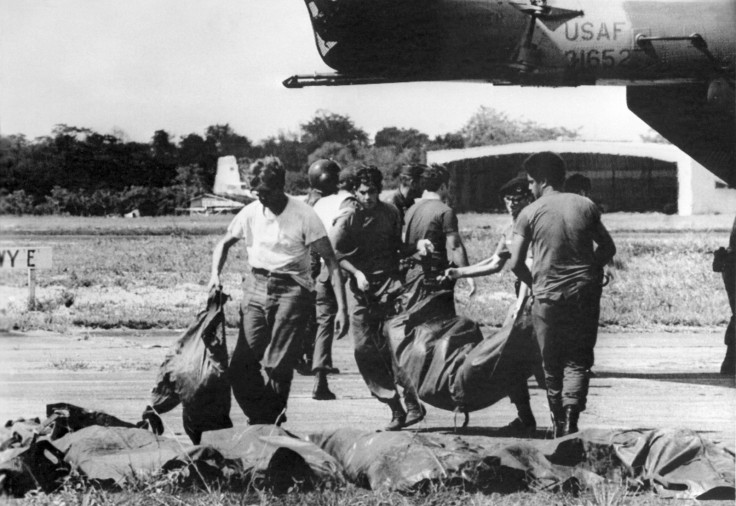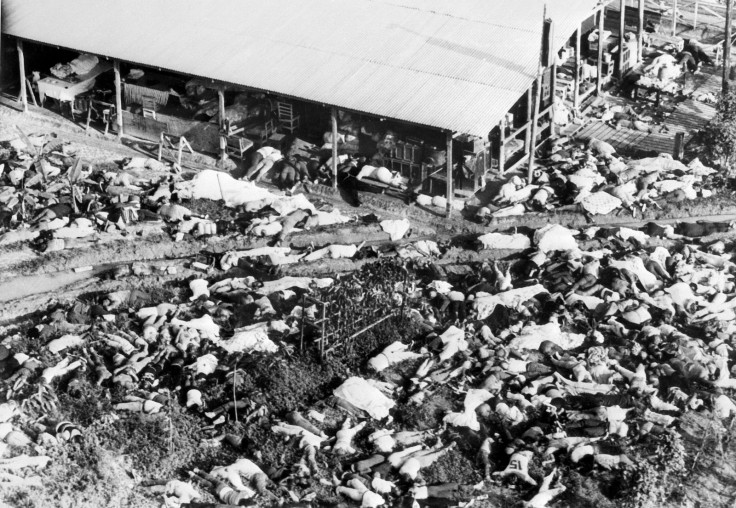Remains of Jonestown Massacre Victims Discovered in US Funeral Home

The cremated remains of nine victims of a 1978 mass cult murder-suicide in Jonestown, Guyana, have been discovered in a former funeral home in Delaware, according to officials.
The remains were found among 38 containers of unclaimed ashes inside the former Minus Funeral Home, said Kimberly Chandler, a spokeswoman for the Department of Safety and Homeland Security.
Officials confirmed the state's Division of Forensic Science has taken possession of the remains and are working on identification in order to notify relatives.
Of the 38 containers, that date from the 1970s to the 1990s, 33 were marked and identified.
The bodies of the massacre victims were brought to Dover Air Force Base, home to the US military's largest mortuary.
Dover police Corporal Mark Hoffman told Sky News that it is believed the bodies were cremated after being returned to the States.
"The assumption is these are Jonestown remains that were not claimed at the time," he said. "All remains were properly stored on the premises and there is nothing to suggest abuse of a corpse or anything of a criminal nature."
Jonestown was the informal name for the Peoples Temple Agricultural Project, formed by the Peoples Temple, an American religious organisation under the leadership of Jim Jones in north-western Guyana.

On 18 November, 1978, gunmen from the Peoples Temple cult ambushed and killed California congressman Leo Ryan, three journalists and a defector from the group at a remote jungle airstrip as they visited on a fact-finding mission to investigate reports of abuses taking place in Jonestown.
Shortly afterwards, more than 900 members of the cult died on the same day, when Jones ordered his followers - the majority of whom were American - to kill themselves. All but two members died from drinking cyanide-laced grape juice, while others were shot by guards loyal to the cult leader.
In conversations recorded on a 44-minute cassette tape, known as the "death tape", Jones termed the event "revolutionary suicide". To some extent, the actions were viewed as mass suicide. Yet others, including some Jonestown survivors regard the incident as mass murder and have described people being shot, injected with poison or forced to drink the lethal concoction.
After the deaths, the bodies of the victims were brought to Dover Air Force Base. Many of the bodies were decomposed and could not be identified. Several cemeteries refused to take them until the Evergreen Cemetery in Oakland, California stepped forward in 1979 and accepted 409 bodies. The remaining victims were cremated or buried in family cemeteries.
On Wednesday, Delaware authorities conducted an "exploratory excavation" on the former funeral home property after finding areas of loosely compacted soil.
Dover police Corporal Mark Hoffman told USA Today: "Obviously it's an intriguing story and a tragic story, and to think this was found right here in our jurisdiction, about six blocks from the police department, makes it very compelling to us."
Investigators also uncovered several bronze grave markers for deceased veterans who served in the First World War, as well as an arrowhead, two animal bones, oyster shells and pieces of charcoal.
© Copyright IBTimes 2025. All rights reserved.






















